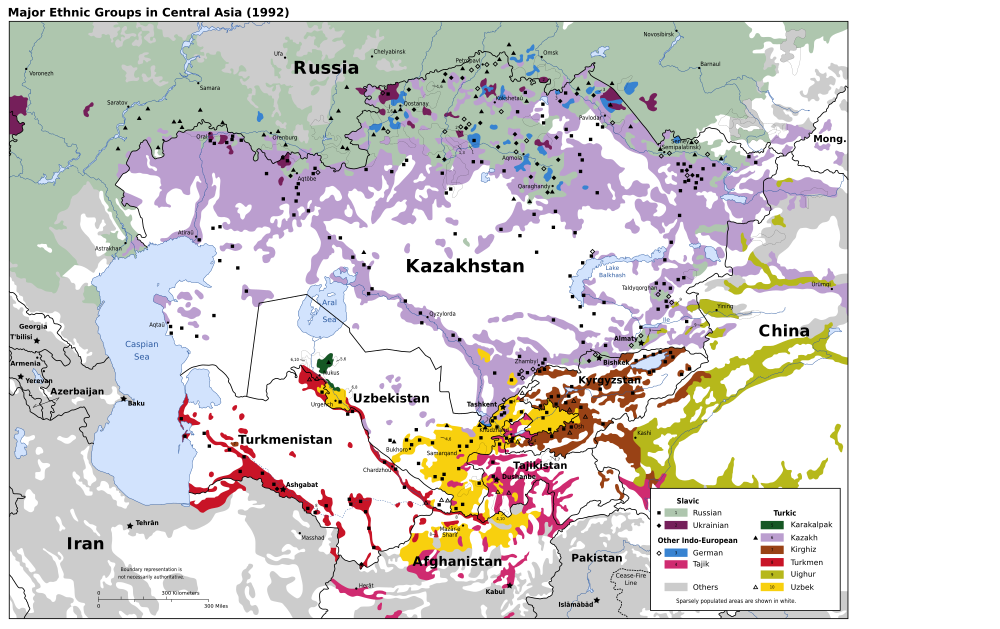37 killed, 500 hurt in new wave of Kyrgyz unrest
BISHKEK, Kyrgyzstan – Mobs of armed men torched Uzbek neighborhoods in southern Kyrgyzstan on Friday in ethnic clashes that officials said left at least 37 people dead and over 500 wounded. A state of emergency was declared in the Central Asian nation that hosts U.S. and Russian military bases.
The rioting in Osh, the country's second-largest city, is the heaviest violence since former President Kurmanbek Bakiyev was toppled in a bloody uprising in April and fled the country.
The intensity of the conflict, which pits ethnic Kyrgyz against minority Uzbeks, appears to have taken authorities by surprise and has thrown the fragile interim government's prospects for survival into doubt.
Quelling the violence will prove a decisive test of the government's ability to control the country, hold a June 27 vote on a new constitution and go ahead with new parliamentary elections scheduled for October.
Dozens of buildings across Osh were ablaze Friday after witnesses reported sustained gunfire beginning late Thursday. Gangs of young men armed with metal bars and stones attacked shops and set cars alight.
The interim government declared a state of emergency Friday in Osh and dispatched armored vehicles, troops and helicopters to pacify the situation. Soldiers were posted at routes into the city and at major intersections, but fighting had not abated by Friday evening and authorities imposed a curfew from 8 p.m. to 6 a.m. until June 20.
Ikram Abdumalitov, who lives in Osh, said around 1,000 young and armed Kyrgyz men were marching toward Uzbek neighborhoods eastern Osh.
"The Uzbeks are in turn chopping down trees and blocking the road to their neighborhood," Abdumalitov said.
Armed men were arriving from nearby villages to join the fight, a trader said, speaking on condition of anonymity due to the dangerous situation.
"I have just driven through the city and the streets are filled with young men brandishing sticks, armor and weapons," said Bakyt Omorkulov, a member of the Coalition for Democracy and Civil Society, a non-governmental group.
He said Uzbek areas were especially hard hit by the violence.
"Aravan street is completely destroyed, dozens of cafes and buildings are burning — it's the same picture in Cheryomushki. It's like being in Chechnya," he told The Associated Press in a telephone interview.
Many of the injured were being treated for stabbing and gunshot wounds, Health Ministry spokeswoman Yelena Bailinova said, giving the death toll. Dozens were reported in serious condition.
A doctor at a hospital in Osh said the final death toll could climb sharply as many Uzbeks were too afraid to seek treatment.
"All the beds in this hospital are full, but 90 percent of the people being treated are Kyrgyz, because Uzbeks are afraid of the Kyrgyz victims' relatives, who are in an extremely aggressive frame of mind," the doctor said. He spoke on condition on anonymity, as he was not authorized to speak to the press.
Smaller-scale ethnic violence also broke out Friday evening in the capital, Bishkek, where a mob of Kyrgyz men attacked and robbed ethnic Uzbeks at a popular bazaar.
In an emotional televised address Friday, interim President Roza Otunbayeva called for a return to calm.
"I would like to appeal in particular to the women of Kyrgyzstan. Dear sisters, find the right words for your sons, husbands and brothers. In the current situation, it is unacceptable to indulge in feelings of revenge and anger," she said.
At a security summit in neighboring Uzbekistan, Chinese President Hu Jintao and Russian President Dmitry Medvedev both expressed concern over fighting and promised to help Kyrgyzstan, a former Soviet republic of 5 million people, restore order.
"We are really interested in seeing Kyrgyzstan overcome the stage of internal upheaval as quickly as possible and solve the task of forming a modern government capable of tackling acute problems of socio-economic development," Medvedev said.
Bakiyev is believed to be in exile in Belarus, but interim authorities accuse his supporters of trying to foment unrest to undermine their control and derail the upcoming referendum and parliamentary election.
Kyrgyzstan hosts the Manas U.S. military air base in Bishkek, a crucial support center supplying forces fighting the Taliban in Afghanistan. Bakiyev's government vowed to close the base last year, but later agreed to let U.S. forces stay after raising the rent to $63 million from $17 million.
In recent weeks, operations at the Manas base have been hindered by a dispute over the interim government's decision to tax fuel sold to the base. The U.S. military says it has stopped refueling tanker planes at Manas while the fuel prices are being renegotiated, but flights to ferry military personnel and supplies to and from Afghanistan have continued.
___
Peter Leonard reported from Almaty, Kazakhstan.
37 killed, 500 hurt in new wave of Kyrgyz unrest - Yahoo! News

